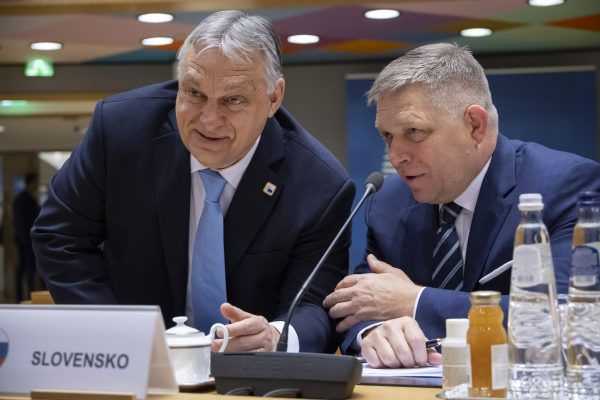Moscow has stepped up its campaign to force Ukrainians to apply for Russian passports as it seeks to legitimize its annexation of occupied territories and integrate them into the Russian Federation. It’s a process that started in 2014 in Crimea, Donetsk, and Luhansk oblasts, using a collection of evolving tactics to erase Ukrainian nationhood.
In May, three months after the full-scale invasion, a decree smoothed the process for granting Russian citizenship to residents of Kherson and Zaporizhzhia oblasts, and ever since people have been forced to hold Russian papers, putting them in line for conscription to Moscow’s forces.
There are different patterns, but the drafting of local residents is happening across the occupied territories. In Crimea, they recruit for the Russian army and the Wagner group. In the occupied areas of Kherson Oblast, conscription orders are issued to collaborators or people who Russian forces consider to be loyal. In Zaporizhzhia Oblast, residents are called into units of the so-called People’s Militia, while in Donetsk and Luhansk oblasts, almost all men get called up, according to Ukrainian Intelligence, and sometimes women.
The occupying authorities have used a carrot-and-stick approach to documentation, announcing that from March 2023, only those with Russian passports will receive pensions and other social benefits in the occupied territories. Because they have banned the circulation of the hryvnia, the Ukrainian currency, people are increasingly dependent on such payments in rubles.
“At the beginning of the occupation, they would give money [social payments] without any passports and tried to ‘bribe’ the population,” said Yurii Sobolevskyi, First Deputy Head of Kherson Oblast Council. “But now they seem to have a plan from Moscow on passportization.”
Access to medical services is also denied to those without a Russian passport or proof of having applied for one. In occupied Tokmak, in Zaporizhzhia Oblast, desks have been set up in hospitals where sick people arriving for treatment have to apply for Russian papers. “People are told they need insurance, and it is only provided to citizens of the Russian Federation,” Sobolevskyi said.
In the Zaporizhzhia region, disabled people and those caring for them can only receive monthly aid payments if they re-register their documents, Ukraine’s National Resistance Center reported. The main requirement for guardians is to obtain a Russian passport. At the same time, people have to write a statement renouncing their Ukrainian citizenship.
Such actions are intended to “strengthen” Russia’s claim to the region by changing its demographic composition, the Center said. For the same purpose, Russia has created favorable conditions for its own citizens who want to move to occupied areas, offering them preferential mortgages to buy property.
Another strategy for forced passportization is firing people for the wrong papers. In occupied Horlivka, Donetsk Oblast, public sector workers have been ordered to obtain a Russian passport by July 1 or lose their jobs. Similar threats have been reported in settlements in Donetsk, Luhansk, and Zaporizhzhia oblasts.

Occupying forces have also threatened to seize vehicles if their owners do not have Russian registration documents. In Luhansk, Zaporizhzhia, and Kherson oblasts, drivers have been told to re-register their vehicles by May 1 in accordance with Russian laws – a process that requires a Russian passport – or risk losing them. No Russian passport, no car.
The move follows a similar strategy last year when documents for real estate and land in Zaporizhzhia Oblast had to be re-registered in line with Russian legislation. The occupiers said they would “nationalize” the properties of those who refused.
“They came to ordinary small businessmen at the end of April and said ‘either you go and register your business according to our new rules and standards, or we will burn everything here tomorrow and you will have nothing,’” Rehina Kharchenko, deputy of the Zaporizhzhia City Council, said in an interview with Radio Liberty Novyny Pryazovia.“Arguing with a person who has a machine gun and full power, you understand that you will not defeat them.”
The dilemma for business owners receiving such ultimatums is if they collaborate with Russian forces and provide them with minibusses, storage space, or premises, they may be found guilty of assisting the enemy after the territories are liberated. If they refuse, it will be taken from them at gunpoint.
As Russia lines up the next cohort of recruits from occupied areas to its armed forces, high school students in Mariupol and the surrounding district have been told they must obtain Russian passports if they want to receive graduation certificates.
On March 14, the Russian Duma passed a law enabling citizens of Ukraine who have been issued Russian passports to renounce their Ukrainian citizenship after applying to the relevant Russian authorities. Ukraine’s Ministry of Foreign Affairs dismissed the legislation, saying Russia was trying to legitimize its attempt to annex Ukrainian territory and impose the illegal passportization of Ukrainian residents.
Ukraine does not recognize the forced automatic acquisition of Russian citizenship by the residents of occupied territories, the ministry said. Forced passportization is not a reason to lose Ukrainian citizenship.
Authorities in Kyiv say Ukrainians forced to take Russian passports will not be prosecuted after liberation. There will only be criminal liability for public servants who switch to Russian citizenship and those who contribute to the program of passportization. A civil servant taking a Russian passport risks being jailed for 10 – 15 years, Iryna Vereshchuk, the Minister for Reintegration of the Temporarily Occupied Territories of Ukraine, said.
Before the full-scale invasion, Russia handed over more than 700,000 passports to residents of the occupied territories of Luhansk and Donetsk, according to Russian officials, while in Crimea, forced passportization affected about 2.5 million Ukrainians.

It is impossible to say how many people have been made to apply for Russian passports since the February invasion, Sobolevskyi said. “We will be able to see it after liberation. It is clear that the figures announced by the occupiers are not close,” he said. “We have seen it in the liberated part of the Kherson region. They said they handed over all these passports and it was not true.”
People in the occupied territories have tried to keep their Ukrainian papers, even after being forced to apply for Russian ones, Sobolevskyi said. Sometimes they simply claim to have lost them when the occupiers demand they hand them over.
Ukrainians living in the occupied territories are hostages faced with an impossible choice. They need to obtain Russian passports if they want to get pensions, social support, or medical treatment for themselves or their families, but the price is enormous.
Once they have Russian papers they are subject to mobilization into Moscow’s army, and risk being forced to fight — and die — for their oppressors.
Elina Beketova is a Democracy Fellow at the Center for European Policy Analysis (CEPA), focusing on the temporarily occupied territories of Ukraine. She worked as a journalist, editor, and TV anchor for various news stations in Kharkiv and Kyiv, and currently contributes to the translator’s team of Ukrainska Pravda, the biggest Ukrainian online newspaper.
Europe’s Edge is CEPA’s online journal covering critical topics on the foreign policy docket across Europe and North America. All opinions are those of the author and do not necessarily represent the position or views of the institutions they represent or the Center for European Policy Analysis.





